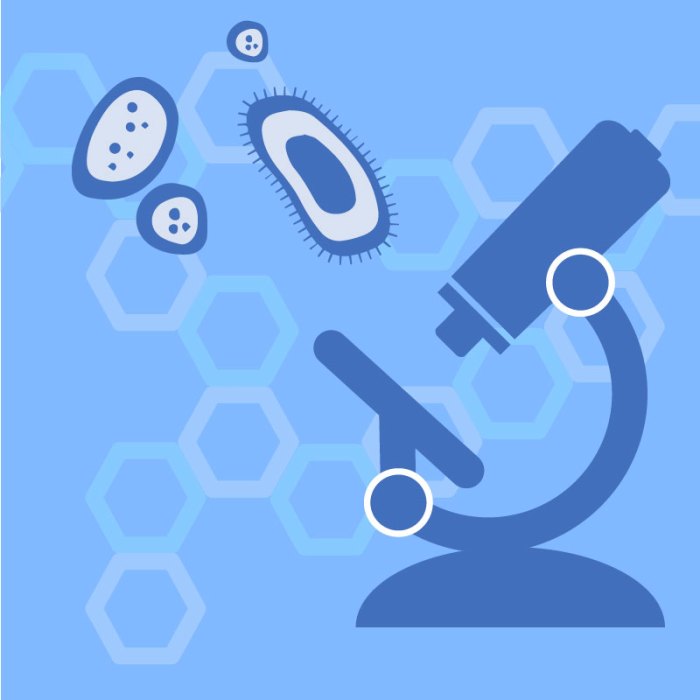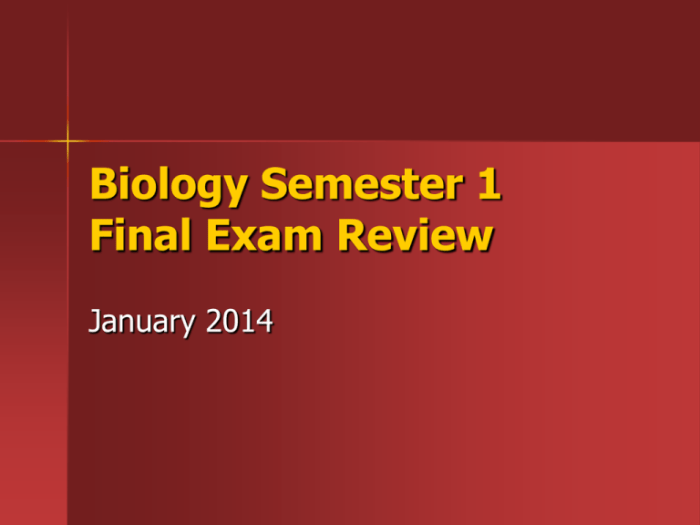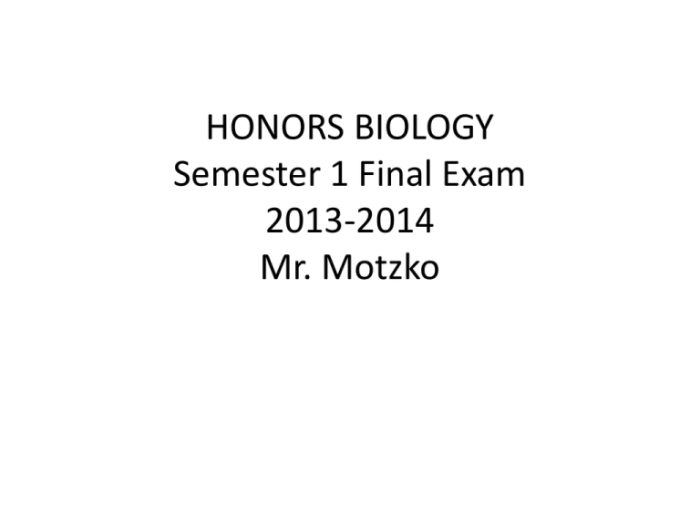Ap biology semester 1 final exam pdf – Prepare for success in your AP Biology Semester 1 Final Exam with this comprehensive guide. Covering key concepts, exam format, study strategies, content review, practice questions, and exam day tips, this resource will empower you to excel in the exam.
AP Biology Semester 1 Final Exam Content

The AP Biology Semester 1 Final Exam covers a wide range of biological concepts introduced in the first semester of the course. These concepts provide a foundation for understanding the complexity of life and its processes.
The exam is divided into two sections: a multiple-choice section and a free-response section. The multiple-choice section tests students’ knowledge of fundamental concepts, while the free-response section assesses their ability to apply their knowledge to solve problems and explain biological phenomena.
Key Concepts Covered in the First Semester of AP Biology
- The Chemistry of Life:The structure and function of biological molecules, including carbohydrates, lipids, proteins, and nucleic acids.
- Cell Structure and Function:The organization and function of cells, including cell membranes, organelles, and the processes of cellular respiration and photosynthesis.
- Cell Division:The processes of mitosis and meiosis, including their roles in growth, development, and reproduction.
- Genetics:The principles of inheritance, including Mendelian genetics, molecular genetics, and genetic engineering.
- Evolution:The mechanisms and patterns of evolution, including natural selection, genetic drift, and speciation.
Format and Structure of the Final Exam
The AP Biology Semester 1 Final Exam is a three-hour exam divided into two sections:
- Multiple-Choice Section:This section consists of 60 multiple-choice questions. Each question is worth one point, for a total of 60 points.
- Free-Response Section:This section consists of six free-response questions. Each question is worth 10 points, for a total of 60 points.
The multiple-choice section is designed to assess students’ knowledge of fundamental biological concepts. The free-response section is designed to assess students’ ability to apply their knowledge to solve problems and explain biological phenomena.
Exam Preparation Strategies
Preparing for the AP Biology Semester 1 Final Exam requires effective study techniques, time management, and utilization of resources. Implement these strategies to enhance your preparation and maximize your performance.
To ensure comprehensive coverage, prioritize topics based on their weightage in the exam. Allocate more study time to complex or challenging concepts. Break down the material into smaller, manageable chunks to facilitate retention.
Practice Questions and Review Materials
Practice questions and review materials are invaluable for reinforcing concepts and identifying areas needing further attention. Utilize online platforms, textbooks, and study guides that provide a variety of question formats. Seek guidance from your teacher or peers to clarify any misconceptions.
Content Review

The first semester of AP Biology covers a wide range of fundamental concepts in biology. These concepts provide a strong foundation for understanding the more complex topics that will be encountered in the second semester.
The major topics covered in the first semester include:
Cell Biology
- Structure and function of prokaryotic and eukaryotic cells
- Cell membranes and transport
- Cell division (mitosis and meiosis)
- Cellular respiration and photosynthesis
Biochemistry
- The structure and function of biological molecules (carbohydrates, lipids, proteins, and nucleic acids)
- Enzymes and enzyme kinetics
- Metabolism (including glycolysis, the Krebs cycle, and oxidative phosphorylation)
Genetics
- Mendelian genetics
- Chromosomal inheritance
- Molecular genetics (DNA structure and function, gene expression)
- Genetic engineering and biotechnology
Evolution
- The history of evolutionary thought
- Natural selection and adaptation
- Population genetics
- Evidence for evolution
Practice Questions and Solutions: Ap Biology Semester 1 Final Exam Pdf

Engaging in practice questions is a valuable strategy for solidifying your understanding of the concepts covered in the AP Biology Semester 1 Final Exam. These questions provide an opportunity to test your knowledge, identify areas where you may need further review, and develop problem-solving skills.
Below, you will find a set of practice questions that encompass the diverse range of topics on the final exam. Each question is accompanied by a detailed solution and explanation to guide your understanding.
Cell Structure and Function
Question:Describe the key differences between prokaryotic and eukaryotic cells. Solution:
- Prokaryotic cells lack a nucleus and membrane-bound organelles, while eukaryotic cells possess both.
- Prokaryotic cells have a single, circular chromosome located in the cytoplasm, whereas eukaryotic cells have multiple, linear chromosomes enclosed within a nuclear membrane.
- Prokaryotic cells have smaller ribosomes (70S) compared to eukaryotic cells (80S).
- Prokaryotic cells typically have a cell wall made of peptidoglycan, while eukaryotic cells have a cell wall made of cellulose or chitin in plants and fungi, or absent in animal cells.
Cellular Processes, Ap biology semester 1 final exam pdf
Question:Explain the role of ATP in cellular processes. Solution:
- ATP (adenosine triphosphate) is the primary energy currency of cells.
- It provides the energy necessary for various cellular processes, such as muscle contraction, nerve impulse transmission, and chemical reactions.
- ATP is generated through cellular respiration, photosynthesis, and substrate-level phosphorylation.
- When ATP is hydrolyzed (broken down), it releases energy that can be used by cells to perform work.
Genetics
Question:Describe the difference between dominant and recessive alleles. Solution:
- Dominant alleles are expressed in the phenotype of an individual even when paired with a recessive allele.
- Recessive alleles are only expressed in the phenotype when paired with another recessive allele.
- In a heterozygous individual (carrying both dominant and recessive alleles), the dominant allele masks the expression of the recessive allele.
Evolution
Question:Explain the concept of natural selection and how it contributes to evolution. Solution:
- Natural selection is a process by which individuals with traits that enhance their survival and reproductive success in a particular environment are more likely to pass on their genes to the next generation.
- Over time, natural selection leads to the accumulation of advantageous traits within a population, resulting in evolutionary change.
- It is a gradual process that occurs over many generations and can lead to the emergence of new species.
Exam Day Tips
Maintaining composure and focus on exam day is crucial for success. Effective time management, pacing, and handling unexpected questions are essential strategies to maximize performance.
Time Management and Pacing
- Allocate time wisely, prioritizing challenging sections and ensuring adequate time for all questions.
- Monitor time regularly to avoid spending excessive time on any one question.
- Utilize the entire exam duration, even if certain questions remain unanswered.
Handling Unexpected Questions
- Stay calm and focus on understanding the question’s intent.
- Identify s and eliminate irrelevant information.
- Apply general principles and logical reasoning to approach the question.
- If necessary, make educated guesses and support them with reasoning.
FAQ Overview
What are the key concepts covered in the AP Biology Semester 1 Final Exam?
The exam covers concepts from cell biology, biochemistry, genetics, and evolution.
How can I effectively prepare for the exam?
Utilize effective study techniques, manage time wisely, and seek out practice questions and review materials.
What resources are available for exam preparation?
Practice questions, review materials, and online resources can aid in your preparation.